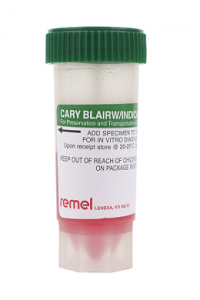LIS Order – Gastrointestinal Profile PCR-Stool-GFH
With overlapping symptoms, distinguishing possible causes of gastroenteritis can be challenging for any clinician. To further complicate diagnosis, traditional testing methods are slow, labor intensive, and fail to reveal the etiology of a patient’s gastrointestinal symptoms. Fortunately, syndromic testing from the BioFire GI Panel eliminates limitations from conventional methods by providing, faster, more accurate, and comprehensive results.
A Single CARY Blair Transport Media Stool will test the following targets with the Biomerieux Biofire Gastrointestinal Panel:
BACTERIAL: Campylobacter (C.jejuni, C.coli, C.upsaliensis), Clostridioides difficile (C. difficile) toxin A/B, Plesiomonas shigelloides. Salmonella Vibrio (V. parahaemolyticus/V. vulnificus/V. cholerae), including specific identification of Vibrio cholerae, Yersinia enterocolitica, Enteroaggregative Escherichia coli (EAEC), Enteropathogenic Escherichia coli (EPEC), Enterotoxigenic Escherichia coli (ETEC) lt/st, Shiga-like toxin-producing Escherichia coli (STEC) stx1/stx2 (including specific identification of the E. coli O157 serogroup within STEC), Shigella/Enteroinvasive Escherichia coli (EIEC)
PARASITIC: Cryptosporidium, Cyclospora cayetanensis, Entamoeba histolytica, Giardia lamblia (also known as G. intestinalis and G. duodenalis)
VIRAL: Adenovirus F 40/41 Astrovirus, Norovirus GI/GII, Rotavirus A, Sapovirus (Genogroups I, II, IV, and V)
Useful For
- The Biofire GI Panel can replace Stool culture, Shigatoxin, Giardia/Crypto, Ova / Parasite Examination, and Viral Stool culture testing. Results will be available within 24 hours.
- Guidelines for testing are patients with clinically significant diarrhea in conjunction with fever, bloody or mucoid stools, severe abdominal pain, or signs of sepsis.
- Inpatients should be tested only once per admission with this assay. Outpatients should only be tested where pathogen identification would result in a change in management.
- Only Stools in Cary Blair transport Media are acceptable for testing. (only one container required for full panel testing)
- Specimens are stable for 4 days at room temperature in Cary Blair Stool Transport Media.
- Our current Clostridioides difficile testing algorithm will remain unchanged.
- Results will be reported as DETECTED, NOT DETECTED, OR EQUIVOCAL.
Method Name
Syndromic PCR Panel
Specimen Type
- Guidelines for testing are patients with clinically significant diarrhea in conjunction with fever, bloody or mucoid stools, severe abdominal pain, or signs of sepsis.
- Inpatients should be tested only once per admission with this assay.
- Outpatients should only be tested where pathogen identification would result in a change in management.
- Only Stools in Cary Blair transport Media are acceptable for testing. (only one container required for full panel testing)
- Specimens are stable for 4 days at room temperature in Cary Blair Stool Transport Media.
Specimen Required
Diarrheal Stool Specimen
- Only Stools in Cary Blair transport Media are acceptable for testing. (only one container required for full panel testing)
- Specimens are stable for 4 days at room temperature in Cary Blair Stool Transport Media.

Specimen Minimum Volume
Add Specimen to fill line on Cary Blair Media
See Cary Blair Media Label for Fill Line

Specimen Stability Information
- Only Stools in Cary Blair transport Media are acceptable for testing. (only one container required for full panel testing)
- Specimens are stable for 4 days at room temperature in Cary Blair Stool Transport Media.
Rejected Due To
Stool Not in Cary Blair Media
Non Diarrhea Stool Submitted
Special Instructions
- Guidelines for testing are patients with clinically significant diarrhea in conjunction with fever, bloody or mucoid stools, severe abdominal pain, or signs of sepsis.
- Inpatients should be tested only once per admission with this assay.
- Outpatients should only be tested where pathogen identification would result in a change in management.
Performing Laboratory
Glens Falls Hospital Laboratory
Reference Values
NOT DETECTED
Day(s) and Time(s) Performed
7-3 and 3-11
Results within 24 hours
